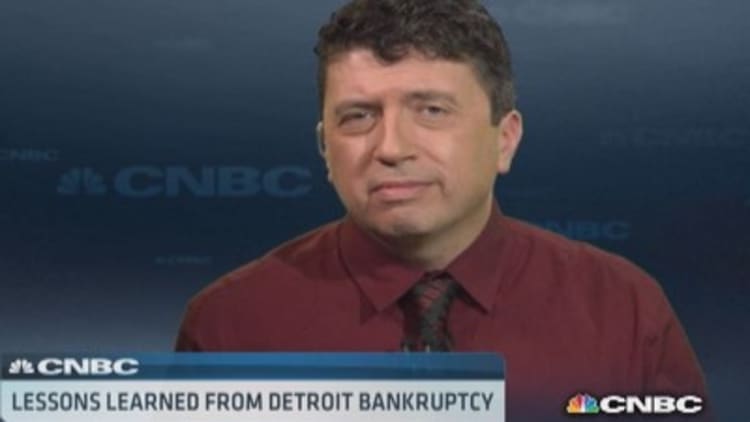
The city of Detroit looks to emerge as at least a survivor if not a winner from its bankruptcy, with bondholders and future municipal borrowers the biggest losers.
That's the picture that has emerged from the troubled Michigan city's struggle to escape from its onerous debt load.
A restructuring plan Detroit filed to escape bankruptcy would impose haircuts of 80 percent or more to bondholders and, according to some analysts, provide a "precedent setting" template for future municipalities that face the same type of fiscal problems.
"Overall, the city's bankruptcy plan is more punitive to bondholders than other creditors," George Rusnak, national director of fixed income at Wells Fargo, wrote in an analysis of the Detroit plan submitted Feb. 21. "This could lead to higher borrowing costs for local governments, particularly in Michigan."
(Read more: )
Rusnak and others on the Wells Fargo fixed income team broke down the implications for the municipal market, noting that if approved it essentially eliminates the implicit guarantee holders of certain municipal bonds receive in return for their investment.
"Historically, market participants have assumed that (unlimited-tax general obligation) bonds were secured claims—given the typical municipal pledge to levy taxes without limitation in order to pay debt service, and, admittedly, a lack of precedence," they said.
"Detroit's plan, if approved in its current form, will change the priority of creditors. While the strength of security provisions vary by state, the city's plan could effectively make UTGO bonds purely a moral obligation or debenture of an issuer."
(Read more: Why Puerto Rico and its mess stand alone)
The plan as outlined would:
- Effectively impose an 80 percent loss on the UTGO bonds as well as limited-tax GO bonds.
- Provide 100 percent of principal for water and sewer bonds but with reduced interest.
- "Repudiate" its certificates of participation, which would mean no recovery for holders of those obligations.
- Pay in full holders of state aid bonds.
- Provide 60 percent to 90 percent pension benefits, though cost-of-living increases would be removed.
From an investor standpoint, Wells Fargo recommends three steps: Wait for more information as potential challenges to the plan emerge; look to fundamentals in the muni market, with a bias toward governments on steadier fiscal ground; and diversify holdings as the ramifications from Detroit unsettle the market.
"Despite the increased risks associated with Detroit's bankruptcy, we continue to believe that municipal bonds offer attractive value on a risk-adjusted basis vs. taxable alternatives," the Wells Fargo note said.
(Read more: Corporate debt fever surges to new record)
A separate analysis from Citigroup concurs that the proposal was "substantially harsher" toward bondholders than what the market had anticipated, but cautioned investors that the last word had not been written.
"Despite its rather aggressive timetable, given its harsh terms, we are likely still far away from the final settlement since investors and monoline insurers, as well as pensioners will all be strongly opposed to the current plan," Citi analyst Mikhail Foux said in a note.
Foux even pointed out that debt backed by big monoline insurers "looks interesting" and said some of the city's water and sewer bonds could provide opportunities as they are priced well below par. He added that another positive is the plan could push unions toward negotiating friendlier pension packages.
—By CNBC's Jeff Cox. Follow him on Twitter @JeffCoxCNBCcom.







